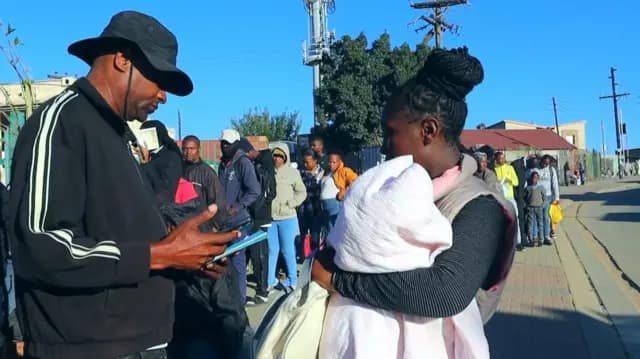We're loading the full news article for you. This includes the article content, images, author information, and related articles.
A South African anti-migrant movement, Operation Dudula, is actively preventing foreign nationals from accessing public health facilities, raising significant concerns about human rights and healthcare access for all residents, including those with chronic conditions.

A community clinic just north of Johannesburg has become a focal point in an escalating battle over access to public healthcare in South Africa. Operation Dudula, an anti-migrant group whose name means “to remove something by force” in Zulu, has been picketing hospitals and clinics in Gauteng and KwaZulu-Natal provinces. Activists are reportedly checking identity cards and denying entry to individuals perceived as non-South African.
This movement, which began as a localised action in 2022, has expanded its reach, with its latest campaign targeting Diepsloot, a densely populated township near Johannesburg. Despite some arrests, authorities have struggled to effectively curb these pickets.
On a recent Thursday morning, Sicelokuhle Moyo, a Zimbabwean national residing in South Africa since 2006, was denied access to a clinic in Diepsloot where she regularly collects medication for a chronic condition. Her experience highlights the direct impact of Operation Dudula's actions on vulnerable individuals.
South Africa's Constitution guarantees the right to healthcare for everyone, regardless of nationality or documentation status. This includes access to primary healthcare services at government facilities, emergency medical treatment, and specific provisions for pregnant or breastfeeding women and children under six years old.
However, Operation Dudula argues that government-funded facilities should exclusively serve South African citizens, claiming that foreign nationals strain already stretched resources. The South African Human Rights Commission (SAHRC) has condemned these actions as unlawful and discriminatory, initiating urgent legal proceedings against Operation Dudula and similar groups.
In July 2025, the SAHRC publicly urged healthcare facilities and law enforcement to ensure non-discriminatory access to services. Despite this, a recent bid by the SAHRC to interdict Operation Dudula from blocking migrants at public clinics was dismissed by the Durban High Court, which ruled the matter was not urgent. The SAHRC has vowed to continue its fight, emphasising that lives remain at risk.
The situation in South Africa contrasts with broader African Union (AU) aspirations for free movement of persons. The AU's 2018 Protocol on Free Movement of Persons, Right of Residence and Right of Establishment aims to progressively implement visa-free entry, residence, and the right to establish businesses across member states. While 33 countries had signed the protocol as of January 2021, only four had fully ratified it, indicating slow progress in continental integration.
In Kenya, the Bill of Rights in the 2010 Constitution also guarantees every person the right to the highest attainable standard of health and emergency medical treatment. However, Kenya is moving to implement a mandatory local health insurance requirement for all foreign visitors, regardless of the duration of their stay, aligning with its goal of universal health coverage. This policy, similar to those in Schengen countries, aims to secure visitors against medical emergencies and bolster the healthcare system's financial viability.
Doctors Without Borders has warned that Operation Dudula's actions could endanger lives, particularly for those with chronic illnesses like diabetes and HIV, who are being denied care. The organisation has also observed instances of healthcare workers and security staff allegedly colluding with anti-migrant groups.
Operation Dudula's president, Zandile Dabula, claims the group has uncovered illegal activities in public healthcare facilities, such as undocumented foreign nationals collecting and reselling medication in their home countries. However, legal and political analysts, such as Dr. Maropeng Mpya, argue that while frustrations over unemployment are valid, blaming migrants is not the solution, and that the role of verifying immigration status belongs to the state, not vigilante groups.
The denial of healthcare to foreign nationals, particularly those with chronic conditions, poses a significant public health risk, potentially leading to increased morbidity and mortality. It also undermines the principles of universal healthcare access and human dignity. The SAHRC has highlighted that such actions are unconstitutional and that vigilante enforcement of immigration laws is unacceptable.
The ongoing confrontations at health facilities could also exacerbate xenophobic tensions within communities. Furthermore, the lack of consistent enforcement against these blockades by law enforcement raises concerns about the state's ability to uphold constitutional rights and maintain order.
The SAHRC's commitment to pursuing legal avenues to protect healthcare access for all in South Africa will be a key development to monitor. The South African government's response to the escalating actions of Operation Dudula and its efforts to ensure constitutional rights are upheld will also be crucial. Additionally, the implementation of Kenya's mandatory health insurance for foreign visitors will offer insights into alternative approaches to managing healthcare access for non-nationals within the continent.
Keep the conversation in one place—threads here stay linked to the story and in the forums.
Sign in to start a discussion
Start a conversation about this story and keep it linked here.
Other hot threads
E-sports and Gaming Community in Kenya
Active 9 months ago
The Role of Technology in Modern Agriculture (AgriTech)
Active 9 months ago
Popular Recreational Activities Across Counties
Active 9 months ago
Investing in Youth Sports Development Programs
Active 9 months ago